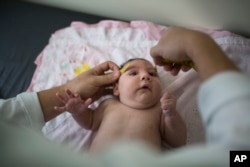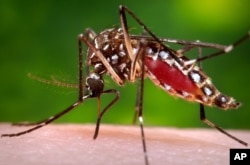Officials in at least three Latin American and Caribbean countries have cautioned women to avoid becoming pregnant because of the severe birth defects caused by the Zika virus, but women’s advocates say that advice is not appropriate.
Colombia, El Salvador and Jamaica have advised women to delay pregnancy after a number of babies born with brain defects caused by the virus have emerged in Brazil.
Alejandro Gavinia, Colombia’s health minister said Colombia is advising the measure because “it’s a good way to communicate the risk, to tell people that there could be serious consequences.”
Monica Roa, vice president of strategy for Women’s Link Worldwide, a women’s rights group, said “It’s incredibly naïve for a government to ask women to postpone getting pregnant in a context such as Colombia where more than 50 percent of pregnancies are unplanned and across the region where sexual violence is prevalent.”
Roa said, “In a crisis like the Zika outbreak, the lack of sexual education is exposed. Health ministries should inform rather than recommend.”
A reproductive rights activist in El Salvador said telling women not to become pregnant is not so simple. Sara Garcia said “There are pregnancies that aren’t planned, are imposed on women and girls and are the product of sexual abuse.”
Women’s rights activists have also faulted health ministries for failing to address the role of men in pregnancies.
Paula Avila-Guillen, programs specialist at the U.S.-based Center for Reproductive Rights said, “Once again, governments put the burden on women to protect themselves from any risks.
CDC guidance
Earlier this week, U.S. health officials issued new guidance for women who might have been exposed to the Zika virus, a mosquito-borne infection that can cause brain damage in a developing fetus. The Centers for Disease Control and Prevention on Thursday warned the virus is spread through mosquito bites and there are no vaccines to prevent the spread and no drugs to treat those affected.
The agency issued a warning to pregnant women to avoid travel to 14 countries and territories in the Caribbean and Latin America affected by the virus. They are Puerto Rico, Martinique, Haiti, El Salvador, Guatemala, Honduras, Panama, Brazil, Colombia, French Guyana, Paraguay, Suriname, Venezuela and Mexico.
The symptoms for Zika include mild fever and rash. An estimated 80 percent of people infected with the virus have no symptoms at all, making it difficult for pregnant women to know whether they have been infected. Bell stressed that there are still many unknowns about the Zika virus.
"This is an emerging situation, it's an emerging virus and things are definitely going to change," she said. Scientists first discovered the virus in Uganda in 1947 while studying monkeys, and isolated it in the 1950s in a human in Nigeria. But medical historians say confirmed cases were rare until 2007, when an outbreak was identified in the South Pacific Federated States of Micronesia.
Ahead of the current Latin America crisis, cases have been identified in Polynesia, Easter Island, the Cook Islands and New Caledonia.







